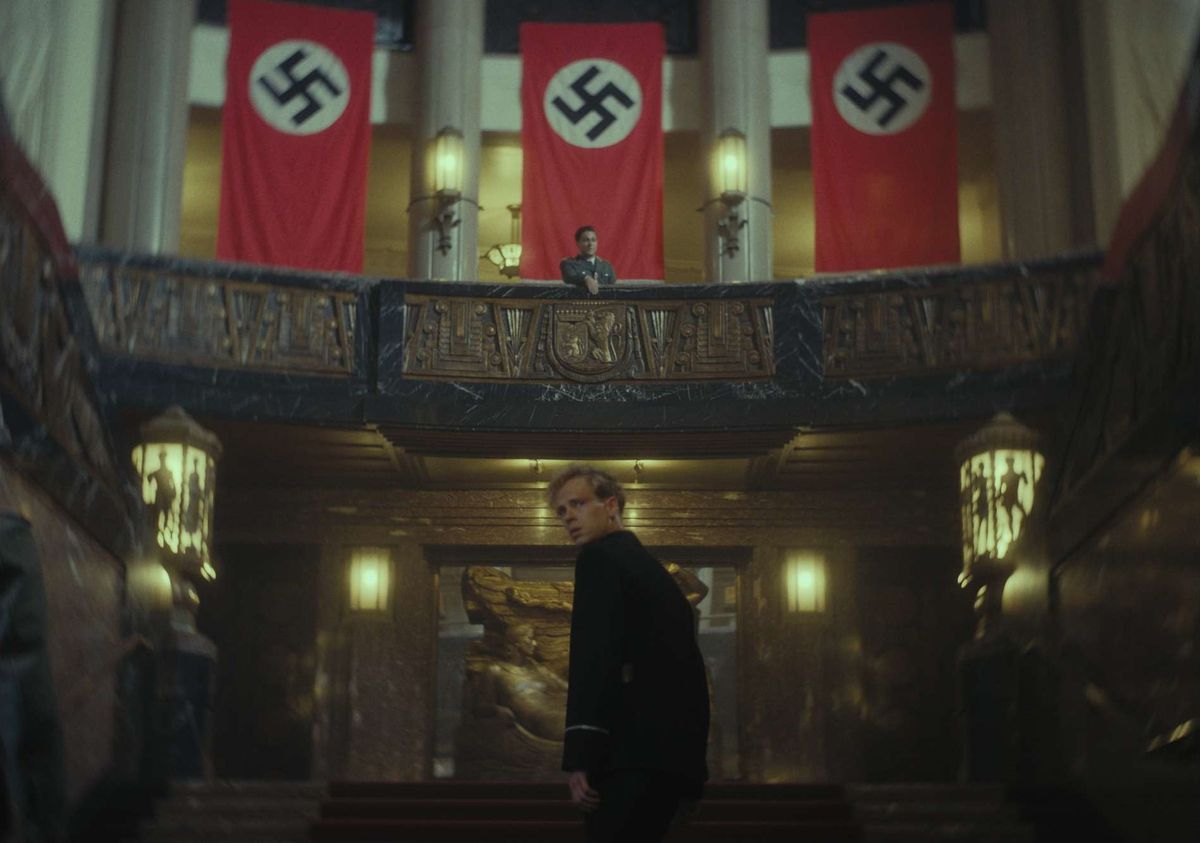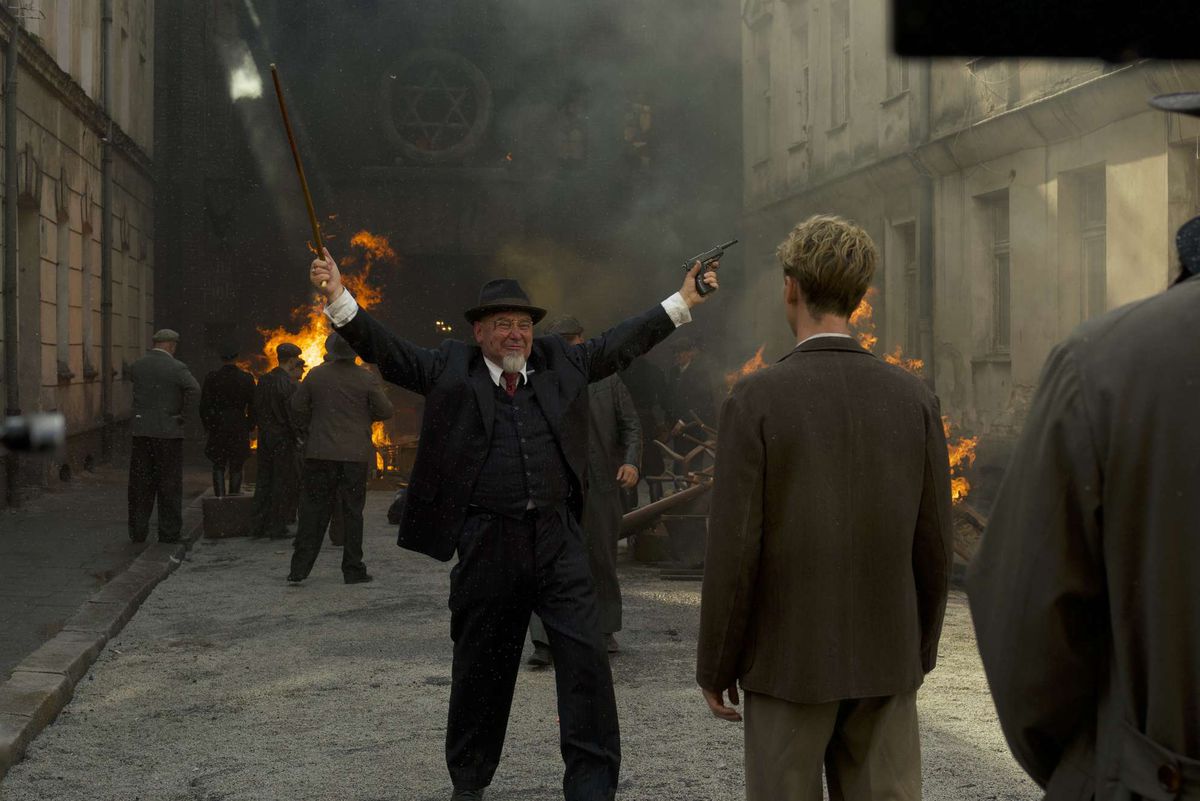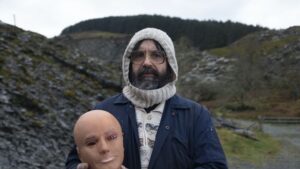Will, Netflix’s imported Belgian movie about the moral impossibility of life under Nazi occupation during World War II, announces itself with shocking bluntness. Within its first 10 minutes, it’s made clear that co-writer and director Tim Mielants intends to confront the grisly horrors of the Holocaust head-on. But it’s also apparent that the film is constructed more like a thriller than a somber drama, and it tightens the screws on its lead character — young policeman Wilfried Wils (Stef Aerts) — in a series of breathless setups with escalating stakes.
It’s an effective way to pull viewers into empathizing with the awful dilemmas faced by an occupied population, and into bearing fresh witness to familiar horrors. But the thriller genre sets up expectations — climax, catharsis, redemption — which risk trivializing the material, and set something of an ethical trap. Who’s going to fall into it: the filmmakers, or the audience? Mielants is too tough-minded to be caught, it turns out, but that’s bad news for the rest of us. Will nurses a glimmer of hope in the darkness, only to snuff it out completely. This is a bleak, bleak movie.
It’s 1942, and Wil (referred to in the subtitles by the Dutch spelling of his name, despite the English title Will) and Lode (Matteo Simoni) are fresh recruits to the police force in the port city of Antwerp. Before their first patrol, their commanding officer, Jean (Jan Bijvoet), hands out regulation platitudes about the police being “mediators between our people and the Germans.” Then he sheds that pretense and offers some off-the-record advice: “You stand there and you just watch.” The ambiguity of these words echoes through the whole movie. Is it cowardice to stand by and watch the Nazis at work, or heroism to refuse to cooperate with them? Are the occupied Belgians washing their hands of the Nazis’ crimes, or bearing witness to them?
Wil and Lode don’t have long to contemplate these questions. No sooner have they left the station on their first patrol than a ranting, drugged-up German soldier demands they accompany him on the arrest of some people who “refuse to work”: a Jewish family, in other words. The young men are initially paralyzed by the situation, but things spiral out of control, more through desperation than heroic resistance on the part of the two policemen. In the aftermath, Lode and Wil return to work in a state of paranoid terror.

Mielants, working with screenwriter Carl Joos from a novel by Jeroen Olyslaegers, wastes no time in using this premise to explore the paranoid quagmire of the occupied city. Can the two young men trust each other? Where do their sympathies lie? Wil’s civil-servant father leads him to seek help from local worthy Felix Verschaffel (the excellent Dirk Roofthooft), who boasts of being friends with the Germans’ commanding officer, Gregor Schnabel (Dimitrij Schaad). Suddenly, Wil is indebted to a greedy, antisemitic collaborator.
Meanwhile, Lode’s mistrustful family — especially his fiery sister Yvette (Annelore Crollet) — want to know more. Does Wil speak any German at home? What radio station does he listen to? In occupied Antwerp — a region where German and French phrases naturally mix in with the local Dutch dialect — an innocent choice of word or of leisure listening comes freighted with dangerous political significance. “There isn’t much on the radio,” Wil responds. “Can you recommend something?”
Time and again during the movie, Wil uses deflections like this to squirm out of taking a position on the occupation. But eventually, he starts working to save Jewish lives. Actions may speak louder than words, but even in the teeth of a febrile affair with Yvette, Wil continues to keep his words to himself. As Schnabel’s net closes in, Wil’s caution keeps him and his friends alive, but the cost is heavy.
It’s a bold move to center a thriller about the Holocaust on a protagonist who, on some level, refuses to pick a side. We can only empathize with Wil because Mielants so effectively loads almost every scene and line of dialogue with implicit threat. Will is a tense, dark, frightening movie, filmed claustrophobically in a boxy ratio with lenses that blur the edge of the frame. The acting is intense (sometimes to a fault), and there are frequent bursts of unpleasant, graphic violence as the pressure builds.

But even though Schaad sometimes seems to be doing a weak impression of Christoph Waltz’s Hans Landa in Quentin Tarantino’s Inglourious Basterds, Will isn’t that movie, and Mielants isn’t interested in Tarantino’s style of catharsis. At the end of the movie, the vicious, inescapable trap he set for all the characters simply snaps shut. Will shows that under the remorseless illogic of Nazi occupation, survival is collaboration, and resistance is death.
That’s a miserable payload for the movie to carry, and it’s debatable how constructive it is. Jonathan Glazer’s chilling The Zone of Interest, currently in theaters, shows that challenging new perspectives on the human mechanics of the Holocaust are as essential now as they have ever been. Thirty years ago, Schindler’s List achieved something similar, and just as necessary, through radically different means: It found a thread of hope and compassion that could lead a wide audience into the heart of the nightmare and throw it into relief.
Will is too burdened by its point of view to manage anything similar. It’s clear-sighted on the cruel compromises of occupation and collaboration, but so fatalistic about them that it winds up wallowing in its own guilt and hopelessness. That’s a dark kind of truth, and not necessarily one that anyone needs to hear.
Will is streaming on Netflix now.
- SEO Powered Content & PR Distribution. Get Amplified Today.
- PlatoData.Network Vertical Generative Ai. Empower Yourself. Access Here.
- PlatoAiStream. Web3 Intelligence. Knowledge Amplified. Access Here.
- PlatoESG. Carbon, CleanTech, Energy, Environment, Solar, Waste Management. Access Here.
- PlatoHealth. Biotech and Clinical Trials Intelligence. Access Here.
- Source: https://www.polygon.com/reviews/24057172/will-review-netflix-nazi-thriller-movie
- :is
- :not
- :where
- $UP
- 10
- a
- About
- accompany
- acting
- actions
- advice
- aftermath
- again
- ago
- alive
- All
- almost
- also
- Ambiguity
- an
- and
- Announces
- any
- anyone
- anything
- apparent
- ARE
- arms
- arrest
- AS
- At
- audience
- Bad
- BE
- because
- been
- before
- being
- between
- blur
- boasts
- bold
- builds
- burning
- but
- by
- CAN
- Carl
- carry
- caught
- caution
- Center
- challenging
- Chamber
- character
- characters
- choice
- City
- clear
- Closes
- collaboration
- comes
- completely
- constructed
- constructive
- continues
- control
- COOPERATE
- Cost
- could
- Crimes
- Currently
- Dangerous
- Dark
- Death
- demands
- desperation
- Despite
- dialogue
- different
- dilemmas
- Director
- do
- does
- doing
- Dont
- Drama
- during
- Dutch
- each
- echoes
- Edge
- Effective
- effectively
- end
- English
- escalating
- especially
- essential
- Ether (ETH)
- ethical
- Even
- eventually
- EVER
- Every
- excellent
- expectations
- explore
- faced
- Fall
- familiar
- family
- Film
- filmmakers
- films
- First
- flags
- For
- Force
- found
- FRAME
- French
- frequent
- fresh
- friends
- from
- front
- genre
- German
- glimmer
- going
- grand
- graphic
- Greedy
- Hair
- Hands
- hans
- hat
- Have
- he
- hear
- Heart
- heavy
- help
- him
- himself
- his
- holding
- Home
- hope
- How
- HTTPS
- human
- ii
- in
- In other
- initially
- innocent
- intends
- intense
- interested
- into
- IT
- ITS
- itself
- Jan
- jewish
- JOOS
- jpg
- just
- Keep
- Kind
- Know
- lead
- Leads
- left
- lenses
- Level
- lie
- Life
- like
- Line
- List
- Listening
- Lives
- loads
- local
- LODE
- Long
- louder
- made
- man
- manage
- material
- May..
- means
- mechanics
- Men
- minutes
- mix
- moral
- more
- move
- movie
- much
- name
- nazi
- necessarily
- necessary
- needs
- net
- Netflix
- New
- news
- no
- novel
- now
- occupation
- of
- Offers
- Officer
- on
- ONE
- only
- or
- Other
- our
- out
- own
- part
- patrol
- People
- perspectives
- phrases
- pick
- platitudes
- plato
- Plato Data Intelligence
- PlatoData
- Point
- Point of View
- Police
- political
- Polygon
- population
- position
- pressure
- protagonist
- Questions
- radically
- Radio
- raises
- ratio
- recommend
- Recruits
- redemption
- referred
- region
- Regulation
- relief
- Resistance
- REST
- return
- Risk
- Save
- scene
- Seek
- seems
- Series
- set
- Sets
- Shows
- shut
- side
- significance
- similar
- simply
- sister
- situation
- So
- some
- something
- sometimes
- speak
- spelling
- stakes
- stand
- starts
- State
- station
- streaming
- style
- subtitles
- survival
- taking
- than
- that
- The
- their
- Them
- then
- There.
- These
- they
- things
- thirty
- this
- though?
- threat
- Through
- throw
- Tim
- time
- Title
- to
- too
- triumph
- Trust
- truth
- turns
- two
- under
- us
- uses
- using
- View
- viewers
- walks
- want
- war
- washing
- Watch
- watches
- Way..
- we
- webp
- What
- which
- white
- WHO
- whole
- wide
- will
- winds
- with
- within
- witness
- Word
- words
- Work
- working
- world
- worthy
- years
- you
- young
- zephyrnet
- zone








